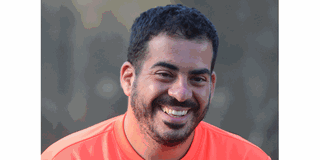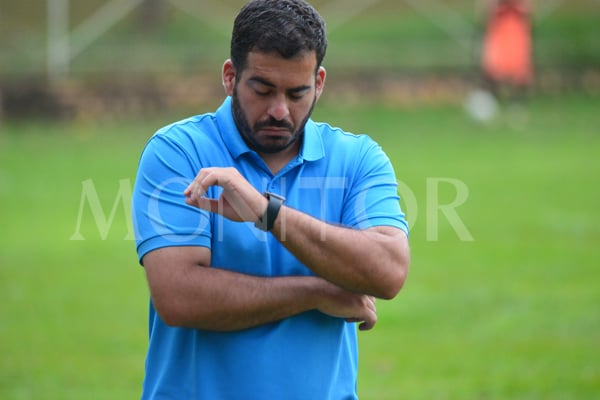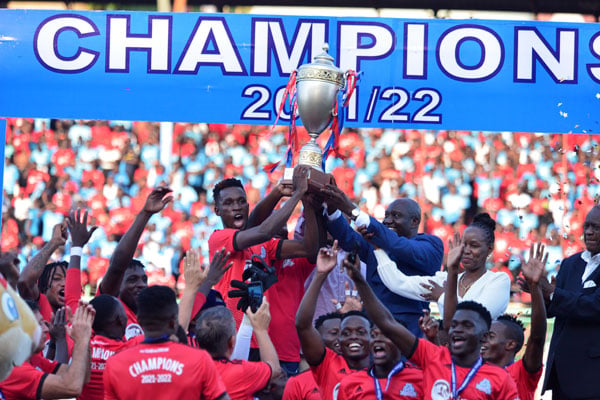Prime
Koukouras on Villa and why next season could be tougher

Bemused. Koukouras finds it funny that he parted ways with a professional club because of some open trials at the club. PHOTO/EDDIE CHICCO
What you need to know:
- In a revealing interview, Petros Koukouras shares detail of his coaching times at Villa.
Petros Koukoras left SC Villa in June feeling hard done-by; but the sacked Greek insists he wishes the Jogoos well, but advises that if things do not change, any new coach will struggle at the record 16-time league champions.
He was due to stay on for another season, at least according to some the club executive, but for a late turn of events.
Of course, there is no hiding that Villa endured a woeful last season, which saw them just survive relegation. But still, Koukouras’ future seemed safe in the interim; not just because he had been promised time and resources to see through his project of returning the club to where they belonged, but because the club reneged on their part.
ALSO READ: SC Villa zero in on Mutebi as next coach
Bar the poor results on the pitch, things started going awkward at the club, according to the 33-year-old Koukouras, when former Villa players Dan Mubiru and Andy Mwesigwa were appointed team manager and technical director, respectively.
The intrigue
“With Dan Mubiru,” Koukouras explained to Score, “our relationship was never good. From the first week he was appointed as team manager, the problems began.
“He had a very poor relationship with most players and he was disorganising the players, especially days before the matches.”
Mubiru refuted the assertions, saying “I did my best to support the team, but if he didn’t appreciate my support, that’s on him.”
Koukouras also accused Mubiru of “planning everything poorly. He cited the game against Mbarara for which the team travelled to and came back the same day.
“We arrived at the stadium 45 minutes before the game, the players did not even have time to have lunch before the match. We ran to the dressing rooms, we went straight for the warm-up and we had the inspection just before the kick off because of lack of time.”
Mubiru declined to comment on the Mbarara issue, instead referring this writer to the club’s executive Mohammad Bazirengedde, also part of Villa’s legal committee.
“So is he (Koukouras) saying that was the case for all the other away matches?” charged Bazirengedde.
“Actually, we have seen teams arrive late and win games. As a coach, you need to plan for that as well. Why did he (Koukouras) conduct morning training on travel day, for example?”
Koukouras defended this, saying “we are not allowed to train in the away stadium (this only happens in continental games), so we were training in some community pitches risking injuries.”
Back to Mubiru, Koukouras says he “made a lot of effort to work with him because Mandela (Hajj Omar, the club president) demanded it but every effort was in vain.
Interference
“It is the first time in my career I see a team manager attending technical meetings and having an opinion about training methods and tactics even though he was not attending all training sessions during the week.”
Koukouras added: “In general, on many occasions he (Mubiru) tried to interfere in my job and do things behind my back.”
But Mubiru dismissed the allegations. “I only did my job as the team manager and never interfered with his work.”
On Mwesigwa, Koukouras offered: “I cannot have a complete opinion as we worked together for very little time but the last few weeks it was obvious he didn’t want to cooperate with me.
“He wanted to recruit his own players from the trials because he wanted to please the executive members.”
According to Koukouras, Mubiru’s alleged ways did not affect him alone. The effect told on the players, too.
“In team meetings, players complained that every little thing happening in the training ground, and which could easily be solved there, always arrived to the top executive and was becoming a big deal.”
“Apart from that, they were always reporting only one side of the story to the executive that was convenient to them in order to make themselves look good without reporting exactly what was on the ground.
“That was creating a very wrong impression to the management of what was happening at the training ground and about the discipline of the players.”
Mubiru denied all the allegations.
“We rarely had meetings all together with the top management,” added Koukouras, “everyone was going individually to serve his own purpose.”
Presidential meet, trials fiasco
Despite these, Koukouras held onto the hope that he had a good relationship with Mandela, and that if he got a chance to meet him, he would explain everything to him.
“I know for sure that there is a lot of politics around the team and he (Mandela) was getting a lot of wrong information.
“I am not sure if my relationship with him has changed because even our last meeting was in a very friendly environment.”
But what exactly did Mandela want to know from the coach when he summoned him for what would turn out to be the final meeting between the two in June, especially given that the executive had concluded that Koukouras would continue for the upcoming season?
“He wanted to know about the trials. His top priority was about the trials and I had already told him multiple times that to make a competitive team for next season we cannot depend on the players from the trials.
“My suggestion was to keep three to four of these players (on trial) to complete the squad and if we can introduce some of them slowly into the team, that will be a bonus.”
But Mwesigwa’s team reportedly wanted more trialists signed up.
“While the team is losing the services of players like Gavin Kizito, Sadam Juma, Amir Kakomo, Nicholas Kabonge, Salim Abdullah, and Bernard Agele,” added Koukouras, “we cannot replace them with players that at best were in regional league last season.”
The Greek coach is, however, at peace with how his short reign at Villa panned out.
“In football nothing can surprise me. You can predict nothing so you must be ready for everything. When I realised that we had a totally different idea about the recruitment of the players, I understood that everything was possible because it was a red line for both of us.
“In March, Mandela asked me to send him a list with players I want to add for next season.
“Since then I never got any feedback about that list and I never knew about the trials and the new recruitment policy until two days before they started.
“But if I am very proud of one thing during my time at SC Villa, it is that I fought very hard with my players to keep the team in the UPL and I walked out with my head up because I refused to lead the team in one of the darkest pages of its history.”
However, even then, Koukouras still found something that surprised him in football, especially the complete turn of events after the club executive had stamped his stay for next season. What exactly changed?
“That’s what I also knew, that I was staying. To my understanding, they tried to cut down the expenses instead of looking for ways to increase the revenue.”
Collapsed Lumala deal
“My plan was to bring some of the top players of the league, all at a young age in order to help the team win titles and bring glory again while playing in the Caf Champions League.
“I asked them to create the Jogoo Young again where all the under 20 players, who were not ready for the first team, can get playing time and when we sell one of our players we can replace him from that team without spending a lot in transfer fees.
“That way we would bring stability to the club both financially and sporting-wise. I have personally spoken with players and negotiated for the club to bring them in at very low fees compared to what they could offer.
“I even agreed with Abdu Lumala to join the club with very favourable terms until the end of last season after they failed to bring me a striker during the January transfer window in order to be able to finish in a respectable league position and challenge for the [Uganda] Cup.
“But some of the executive members mistreated the player when he went to sign his contract and he ran away because he felt disrespected.”
The coach did not divulge on what “mistreatment” amounted to.
Koukouras added: “In one of the meetings, Mr William Nkemba (former Villa player and interim chairman) told us that we should not expect to break the bank to bring players and we should recruit from the trials and if any UPL player accepts our terms, then we can consider him.
“The situation was so bad that when I asked Mr Nkemba to provide us with a pump and a hose pipe to water the pitch, he told me that the cost was too high and he is willing to provide us with buckets to water it.”
Asked what his relationship with Brenda Nambalirwa, who reportedly performs the club CEO roles despite Nkemba being the name on documents submitted to Fufa, Koukouras was unenthusiastic.
“I have met her only a few times. We really didn’t have any relationship. But as far as I know, her biggest contribution to the club was the failure to sign Abdu Lumala.”
Koukouras dismissed reports that he told Hajj Mandela during their final meeting that while he was his boss, he could not teach him how to manage and coach football, something that, it is said, led to the club president making a snap decision to part ways with the Greek.
“That is not true,” explained Koukouras, “he complained that my attitude during the trials was bad because I was watching without interfering with the players.
“I’ve been working as a scout for Reading (United Kingdom) for two years and every Friday they organise trials for new players. I’ve never seen the head of recruitment talking or interfering with the players.
“Although there is no player who can claim that he talked to me and I didn’t respond to him or he approached me and I dodged him. I told him I was just keeping a professional behaviour as I was there to select players and not do PR [publicity].
Did he get enough technical support?
Koukouras reiterates that Villa failed on their promise of full technical support as the club instead operated on autopilot.
“I didn’t get as much help as I wanted. I always wanted people around me who challenge with a purpose, people who will bring new fresh ideas, solutions to our problems, who will help in training on a daily basis, people who will help me to plan and prepare the team for the next game.
“I wanted to bring Hassan Zungu, the assistant coach of Gaddafi, a young and very energetic coach. We talked about football many times and I really liked his ideas.
“I also wanted to bring Dudu Bosco on board in any capacity. He is a man that I have a lot of respect for.
“Last season he proved with Onduparaka that he knows how to recruit good players at the minimum cost and he knows how to find solutions when things get tough.
“Both of them were positive to join me at Villa but what the club told me officially is that there is no budget for additions in the coaching staff.”
Talking of which, did Villa pay Koukouras all they owed him before he left? “With my salaries, Mandela was very professional and he paid everything,” he said. “Although they haven’t paid my daily allowance (transport) since November, which was over Shs10m.
“I decided not to claim it because I want to move on as long as we have decided to part ways. I want to wish them well and honestly, I hope I was wrong in my approach, and hope they get the right way to recruit players.”
Koukouras had one last message: “Either way, this new season is going to be much more difficult than the previous one.”
The club’s promises
Board backing. Petros Koukouras was given the assurances of the board’s full support and an enabling environment to help him stabilise the troubled record champions.
Player transfers. The Greek coach was convinced the Jogoos would reinforce the squad he inherited by acquiring more players from top-flight league.
Technical support. Koukouras believed the club would back him to beef up his backroom staff with coaches of his choice and went as far as headhunting at least two local coaches.
Salaries. Koukouras was assured his salaries and allowances would all be catered as opposed to recent past when coaches were not paid their dues.
What was served instead
Board backing. Petros Koukouras says the arrival of Dan Mubiru as team manager upset technical operations at the club due to the wanton interference in his works.
Player transfers. The Greek coach was left in the cold in the January transfer window and efforts to sign forward Abdu Lumala was frustrated by Exco.
Technical support. Koukouras has lined up Hassan Zungu from Gaddafi and Dudu Bosco from Onduparaka and despite the two young coaches agreeing to work with him, club sat on it.
Salaries. Omar Mandela paid Koukouras his full salary upon termination of contract but transport allowances worth Shs10m was not paid.




